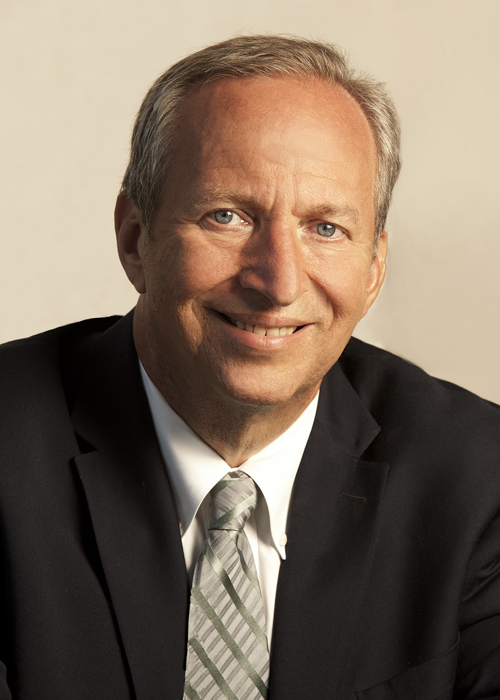
Lawrence Summers
Lawrence Henry Summers (born November 30, 1954) is an American economist who served as the 71st United States Secretary of the Treasury from 1999 to 2001 and as director of the National Economic Council from 2009 to 2010. He also served as president of Harvard University from 2001 to 2006,[1][2] where he is the Charles W. Eliot University Professor and director of the Mossavar-Rahmani Center for Business and Government at Harvard Kennedy School.[1][3][4] In November 2023, Summers joined the board of directors of artificial general intelligence company OpenAI.[5]
Lawrence Summers
Summers became a professor of economics at Harvard University in 1983. He left Harvard in 1991, working as the Chief Economist of the World Bank from 1991 to 1993.[6][7][1] In 1993, Summers was appointed Under Secretary for International Affairs of the United States Department of the Treasury under President Bill Clinton's administration. In 1995, he was promoted to Deputy Secretary of the Treasury under his long-time political mentor Robert Rubin. In 1999, he succeeded Rubin as Secretary of the Treasury.[7][1][8] While working for the Clinton administration, Summers played a leading role in the American response to the 1994 economic crisis in Mexico, the 1997 Asian financial crisis, and the Russian financial crisis. He was also influential in the Harvard Institute for International Development and American-advised privatization of the economies of the post-Soviet states, and in the deregulation of the U.S financial system, including the repeal of the Glass-Steagall Act.
Following the end of Clinton's term, Summers served as the 27th president of Harvard University from 2001 to 2006. Summers resigned as Harvard's president in the wake of a no-confidence vote by Harvard faculty, which resulted in large part from Summers's conflict with Cornel West, financial conflict of interest questions regarding his relationship with Andrei Shleifer, and a 2005 speech in which he offered three reasons for the under-representation of women in science and engineering, including the possibility that there exists a "different availability of aptitude at the high end", in addition to patterns of discrimination and socialization.[9]
After his departure from Harvard, Summers worked as a managing partner at the hedge fund D. E. Shaw & Co. Summers rejoined public service during the Obama administration, serving as the Director of the White House United States National Economic Council for President Barack Obama from January 2009 until November 2010, where he emerged as a key economic decision-maker in the Obama administration's response to the Great Recession.[7][1]
Early life and education[edit]
Summers was born in New Haven, Connecticut, on November 30, 1954, into a Jewish family. He was the son of two economists, Robert Summers (who changed the family surname from Samuelson) and Anita Summers (of Romanian-Jewish ancestry), who were both professors at the University of Pennsylvania. He is also the nephew of two Nobel laureates in economics: Paul Samuelson (brother of Robert Summers) and Kenneth Arrow (brother of Anita Arrow Summers). He spent most of his childhood in Penn Valley, Pennsylvania, a suburb of Philadelphia, where he attended Harriton High School.
At age 16,[10] he entered Massachusetts Institute of Technology (MIT), where he originally intended to study physics but soon switched to economics, graduating in 1975. He was also an active member of the MIT debating team and qualified for participation in the annual National Debate Tournament three times. He attended Harvard University as a graduate student, receiving his Ph.D. in 1982.[11] In 1983, at age 28, Summers became one of the youngest tenured professors in Harvard's history. He was a visiting academic at the London School of Economics in 1987.[12]
Personal life[edit]
Summers was diagnosed with Hodgkin's lymphoma around 1983, underwent treatment and has remained cancer-free. Summers has three children (older twin daughters Ruth and Pamela and son Harry) with his first wife, Victoria Joanne (Perry).[106][107] In December 2005, Summers married English professor Elisa New, who has three daughters (Yael, Orli and Maya) from a previous marriage. He lives in Brookline, Massachusetts.[108]
In popular culture[edit]
The 2010 film The Social Network, which deals with the founding of the social networking site Facebook, shows Summers (played by Douglas Urbanski), in his then-capacity as President of Harvard, meeting with Cameron and Tyler Winklevoss to discuss their accusations against Mark Zuckerberg.
In the 2010 documentary Inside Job, Summers is presented as one of the key figures behind the financial crisis of 2007–2008. Charles Ferguson points out the economist's role in what he characterizes as the deregulation of many domains of the financial sector.[109]
In The Simpsons episode "E My Sports" (S30 E17), first broadcast March 17, 2019, the character Principal Seymour Skinner looks at a $100 bill and remarks "$100 bill, autographed by Lawrence Summers. Such a carefree signature, before the great recession."